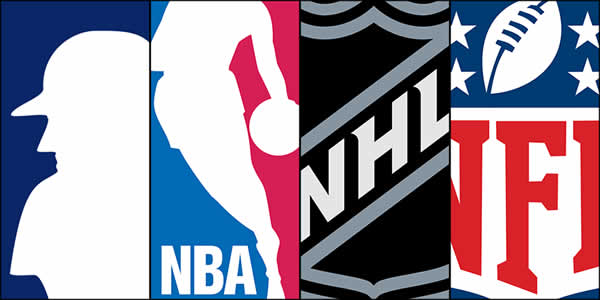Currently all 4 US major sports leagues are awaiting a decision from the Supreme Court on whether sports betting will be banned or permitted by federal law.
In 2012, governor Chris Christie signed a state law to allow sports betting at racetracks and casinos in New Jersey. He was immediately sued by the NCAA and other professional sport leagues and the Christie vs. NCAA case soon made its way to the Supreme Court and is now awaiting a decision to be handed down regarding if states can authorize sports betting. The Professional and Amateur Sports Protection Act (PAPSA), outlawed sports betting nationwide in 1992 except for in Nevada, Oregon, Delaware and Montana. New Jersey had one year after the PAPSA law went into effect to set up regulated sportsbooks at their casinos but opted not to at the time.
3 of the 4 professional sport leagues in the United States have expressed interest in sports betting, only the National Football League (NFL) was fiercely opposed to online sports betting at the time of the New Jersey case. Now, the leagues are preparing for sports betting and hoping to have a say in how the legalization of the industry will take effect. Both the National Basketball Association (NBA) and Major League Baseball (MLB) see sports betting as a potential enhancement to their sport. Sports betting could enhance fan interest and provide revenue opportunities for their select sports. Both leagues also suggest that regulations need to be put in place before legalized.
Since 2012 much has changed around the professional sporting leagues. The NBA and MLB both have new league commissioners that aren’t as opposed to sport betting at all compared to the last commissioners. In fact, Rob Manfred is the new commissioner of the MLB and has stated that if legalized he would like a seat at the table. The NFL still hasn’t recently stated their stance but is believed to have lightened up on the matter.
The NHL is the least concerned with legal sportsbooks, commissioner Gary Bettman said that “Gambling for us is probably an entirely different focus than, say, football or basketball, either at the pro or at the college level. We’re about one percent of the book. Our game doesn’t lend itself to gambling in the same way that football and basketball do. From our standpoint, as we focus on gambling it’s about creating the right environment in the arena, making sure it continues to be family friendly, which it is for us. I believe in our players and their professionalism, so it’s not about the integrity of the game, it’s about the environment.” The NHL is the first league to place a professional team in Las Vegas, but the NFL will soon follow in 2019. Sports betting has been legal in Nevada since 1949 and is widely wagered on by sport fanatics.
The NFL is the only American league to have recently played overseas where online sportsbooks are legal and with one of their teams moving to Vegas you can only suspect that the NFL is changing its stance on sports betting. NFL commissioner Rodger Goodall has embraced fantasy sports but argued that it is not gambling because the game is based on individual players performance and not the outcome of the games.
Opponents of federally legalized online gambling believes that it preys on the vulnerable and could open the door for online casinos to exploit the financially desperate. Legal online gambling and sportsbooks might entice more people to place bets, but it is already widespread. The American Gaming Association (AGA) estimates that Americans spend about $150 billon a year on sports bets alone, with 97% of those bets being illegal.
With the growth of technology comes the growth of the internet and services that are offered over the web. The technology that has allowed people to place bets online in recent years is the same technology that has made game-fixing more difficult and now easier to spot in real time. With the paychecks that most athletes make playing professional sports it is hard to believe that someone would throw a game for a bookie, but if they do there should be some stiff consequences.
The leagues are concerned that the Supreme Court will allow sports betting and online gambling to become legal without protections in place and that certain circumstances could arise and result in loss of integrity and respect for the game. An NBA spokesman said the league “prefers a comprehensive federal approach to legalized sports betting, as opposed to a hodgepodge of state-by-state laws.” If the court favors with New Jersey it will be up to individual states to make regulations and laws for online gambling and sportsbooks.
Source: www.FoxBusiness.com

